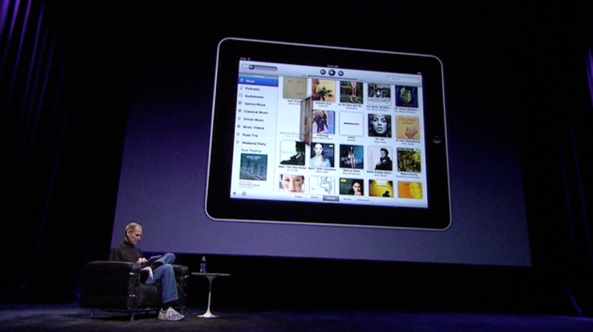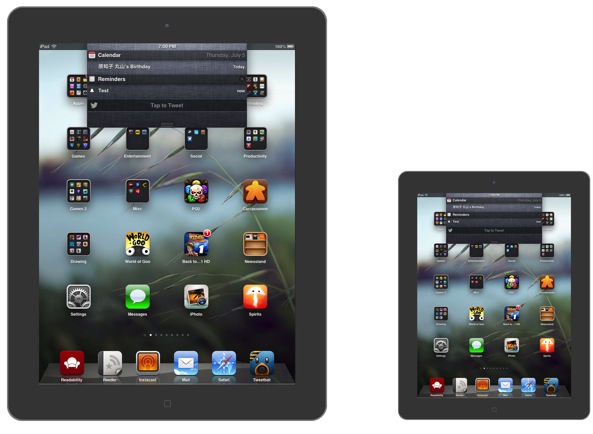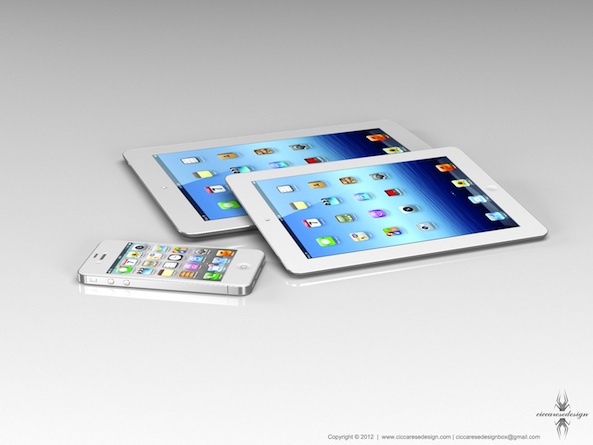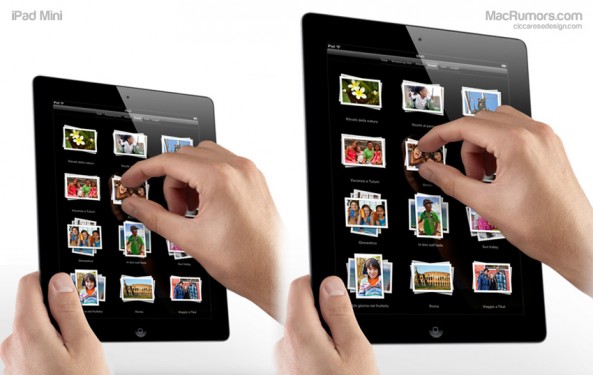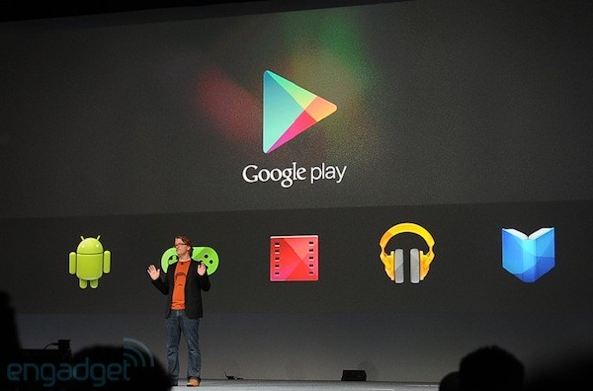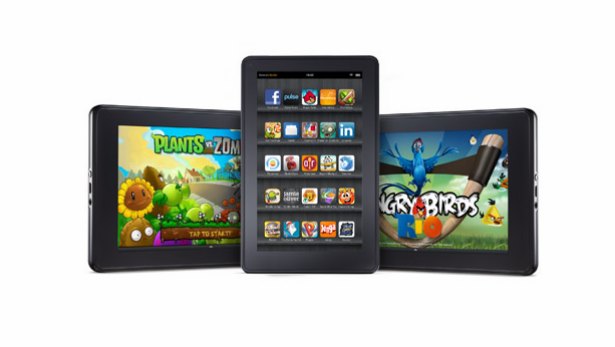I just read this argument how anyone that thinks Apple might do an iPad mini because of the Kindle Fire or Nexus 7 should be banned from writing about Apple. Seriously? I’d wager it’s the other way round. Apple absolutely cannot afford to sit on the sidelines while Amazon and Google take over its prospective customers on the low-end and lock them into their ecosystems.
Yes, Apple knows all too well that Google’s $199 Nexus 7 is a game-changer. Tim Cook understands this thing is gonna be big and you can bet he’ll do something about it. Why else do you think Apple has started alerting the press that it’s been working on a seven-inch competitor…
Unless you’ve been sleeping under a rock this week, you must have read stories by Bloomberg and The Wall Street Journal, Apple’s favorite unofficial mouthpieces which have revived the old iPad mini rumor. A shrunken iPad is supposedly arriving in September, at half the price, to nuke the Amazons and Googles of this world out of orbit.
But many are scratching their head. The iPad mini raises more questions than offers answers. One that’s been keeping industry watchers up at night: will its smaller touchscreen be still comfortably big enough to hit user interface targets?
Gabe Glick over at MacStories is not so convinced. A seven-inch iPad, he analyzes, would be half the iPad’s 9.7-inch screen size, making it difficult to hit the controls if apps were presented pixel-for-pixel from their 1024-by-768 pixel version.
And wouldn’t a $249 iPad mini hurt sales of its $399/$499 iPad 2/iPad 3 counterpart?
Topeka Capital Markets analyst Brian White expects minor cannibalization of the current iPad by the iPad mini (10-20 percent), but points out the smaller device may give Apple a larger market opportunity than its bigger brother, potentially even outsell it.
Specifically, the iPad mini could become a smash hit in education and developing markets like China. Also, this on two-iPad families:
“We would not be surprised if certain consumers end up owning both a regular-sized iPad and an iPad mini, swapping between the two devices for different occasions,” he writes.
White notes that iCloud further enables content on the two iPads to be automatically duplicated and easier to share among Apple devices.
You know why I’m not sold yet?
The most realistic size approximation we’ve seen so far of the regular iPad and the rumored seven-incher. Perhaps a piece of sandpaper will indeed ship with the latter?
It’s because of this quote from Apple’s conference call with investors, when Jobs unexpectedly tuned in to trash Android and address so-called tweener tablets:
Let’s talk about the avalanche of tablets. First, there are only a few credible competitors. And they all have seven-inch screen. This size isn’t sufficient to create great tablet apps.
And this size is useless unless you include sandpaper so users can sand their fingers down to a quarter of their size.
The sandpaper bit was funny, I’ll give him that.
But what about this part?
We’ve done extensive testing and 10 inches is the minimum tablet size. Given that tablet users will have a smartphone in their pocket, there’s no point in giving up screen size.
Seven inch tablets are tweeners – too big to be a phone, and too small to compete with the iPad.
The rumor-mill claiming the opposite, that Cupertino’s doing the very same device its late co-founder laughed off, implies Tim Cook is his own man who runs Apple differently (exactly how Jobs groomed him).
That was then. A lot can happen in a year’s time. 2012 is in many ways much different than 2010, when the first iPad caught Apple’s competitors on the wrong foot.
In my opinion, a 2012 Apple under Steve Jobs would no doubt realize Amazon’s success in the seven-inch space and release a competing device of its own.
Another perfectly conceivable explanation: Google’s Nexus 7 is making waves. Hence, Apple must respond.
And why is that?
Because Google is the enemy and this is a platform play.
Amazon, Apple and Google are gonna duke it out over who becomes the dominant one-click entertainment shopping mall on the web.
It isn’t about the iPad versus Nexus 7 versus Kindle Fire.
It’s iTunes versus Play Store versus Amazon Store.
In this game, hardware is only means of creating a lock-in so people stay in the ecosystem and continue spending money on content.
What scares Apple, in my opinion, is that with the Kindle and Nexus 7 both Amazon and Google realistically have decent chances of luring undecided customers or budget buyers into their ecosystem.
Once they’re in, these customers are lost. Apple can do little to persuade them to jump ship because they’ve already poured their time and money into apps and media. Who wants to repurchase their Angry Birds, Instapaper, Real Racing, weather apps, news reading clients and other favorite programs?
Back to that Jobs quote.
Yes, Steve Jobs wasn’t concerned about tweener tablets back in 2010 because they all sucked.
Nobody in 2010 had an ecosystem that could even remotely match iTunes, except for Amazon which however wouldn’t create a tablet until Q4 2011.
If anything, the Kindle Fire has proved that an ecosystem provider like Amazon can succeed selling hardware below cost and make up for losses with content sales. And just like Amazon, Google isn’t afraid to take a hit with every Nexus 7 it sells.
If I were Apple, I’d worry that Google’s created an ecosystem to rival iTunes.
Now there’s greater choice for people who aren’t keen on spending four hundred bucks on a tablet.
Do you live in the Amazon world?
Cool, there’s your tablet that you can use to continue spending money with them.
Hate Apple?
Great! Google’s got you covered.
And both technology giants will happily sacrifice their own profit just to sell you a tablet at half the cost of a 16GB WiFi iPad 2. Don’t you find this just a little tad too conspicuous?
They want you inside their ecosystems that rival Apple’s in many ways.
[tube]sulfQHdvyEs[/tube]
So, if one thing changed drastically between the first iPad’s debut in April 2010 and today, it’s competition. Apple clearly must respond to this growing threat or else the company risks losing many, many more millions of potential customers who will go Google or Amazon just because Apple doesn’t have a smaller, inexpensive iPad for them.
Hence, a $249 iPad mini.
Thoughts?
Note: this is a strongly expressed opinion piece on the topic of iPad mini and doesn’t reflect the views of the whole iDB team and all of that fun stuff.
